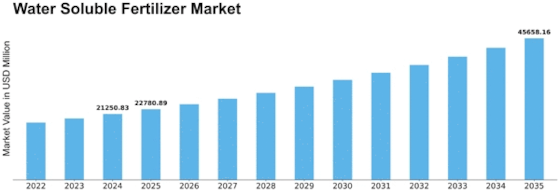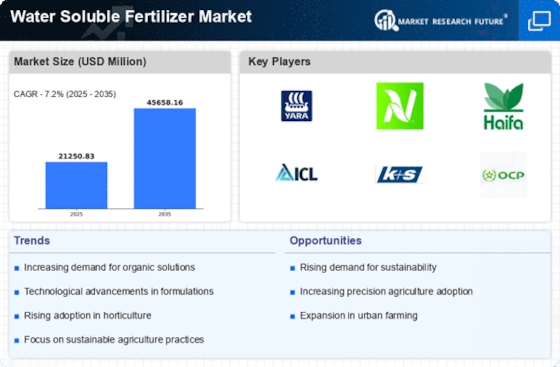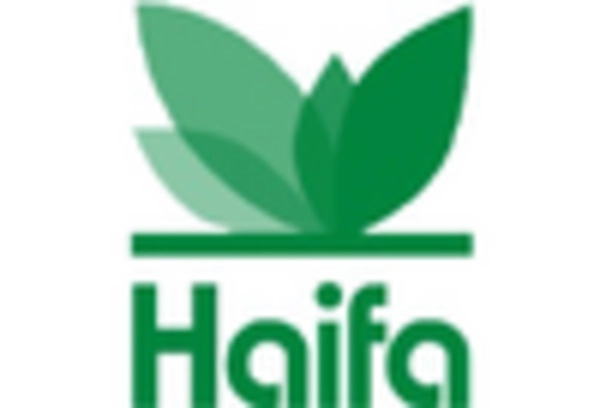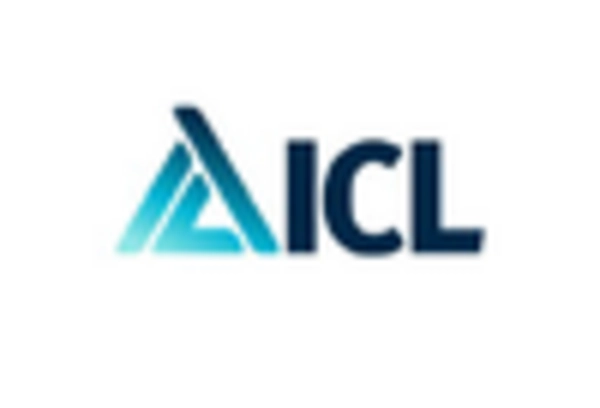Water Soluble Fertilizer Size
Water Soluble Fertilizer Market Growth Projections and Opportunities
water-soluble fertilizers market size of is influenced by various factors that shape its growth and dynamics. One significant factor is the increasing demand for high-efficiency fertilizers to improve crop yields and enhance agricultural productivity. Water-soluble fertilizers are formulations that dissolve easily in water, allowing for rapid nutrient uptake by plants through both foliar application and fertigation. With growing global population and food demand, farmers are increasingly adopting water-soluble fertilizers to meet the nutritional needs of crops, optimize nutrient management, and achieve higher yields.
Government policies and regulations also play a crucial role in shaping the water-soluble fertilizer market. Regulatory agencies impose standards and guidelines for fertilizer production, labeling, and application to ensure product safety, quality, and environmental sustainability. These regulations may include restrictions on nutrient concentrations, guidelines for fertilizer use efficiency, and environmental impact assessments. Moreover, government support in the form of subsidies, incentives, and financial assistance programs may influence farmer decisions regarding fertilizer adoption and application practices.
Technological advancements drive innovation and growth in the water-soluble fertilizer market. Manufacturers invest in research and development to develop new formulations, nutrient combinations, and delivery systems that improve fertilizer efficiency, solubility, and plant availability. Advanced manufacturing processes, such as spray drying, granulation, and micronization, enable the production of water-soluble fertilizers with tailored nutrient ratios, controlled release properties, and enhanced nutrient stability. Moreover, advancements in precision agriculture technologies, such as soil sensors, remote sensing, and automated irrigation systems, facilitate the precise application of water-soluble fertilizers based on crop nutrient requirements and soil conditions.
Market factors such as changes in agricultural practices and cropping patterns influence the demand for water-soluble fertilizers. As farmers adopt intensive cropping systems, protected cultivation, and hydroponic farming techniques, there is a growing need for fertilizers that can be easily applied through irrigation systems and provide precise control over nutrient delivery. Water-soluble fertilizers offer advantages such as uniform nutrient distribution, reduced nutrient leaching, and enhanced nutrient uptake efficiency, making them ideal for use in high-value crops, greenhouse production, and soilless growing systems.
Economic conditions and market competition impact the water-soluble fertilizer market landscape. The affordability and availability of water-soluble fertilizer products are essential considerations for farmers, particularly in regions with diverse socio-economic backgrounds. Economic factors such as input costs, crop prices, government subsidies, and market demand influence farmer decisions regarding fertilizer purchases and application rates. Moreover, market competition among fertilizer manufacturers, distributors, and retailers drives innovation, product differentiation, and pricing strategies, benefiting farmers with a wide range of fertilizer options and technologies.
Environmental considerations are integral to the water-soluble fertilizer market, given its connection to soil health, water quality, and ecosystem sustainability. Sustainable agriculture practices prioritize nutrient stewardship, soil conservation, and water management, minimizing the environmental impact of fertilizer use. Water-soluble fertilizers can help reduce nutrient runoff, groundwater contamination, and soil erosion by delivering nutrients directly to plant roots and minimizing excess nutrient application. Moreover, fertilizers with balanced nutrient ratios and slow-release formulations can improve nutrient use efficiency and minimize nutrient losses to the environment, promoting ecological resilience and resource conservation.
Consumer perceptions and preferences also play a role in shaping the water-soluble fertilizer market. Public attitudes towards fertilizer use and environmental sustainability vary widely depending on factors such as cultural beliefs, scientific literacy, and media coverage. While some consumers express concerns about the potential risks of fertilizer runoff and water pollution, others recognize the importance of fertilizers in supporting food production, crop nutrition, and global food security. Consumer demand for sustainably produced food products and transparent supply chains may influence farmer and industry decisions regarding fertilizer selection and application practices.



















Leave a Comment